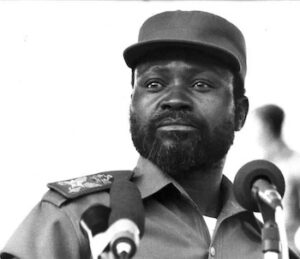
Samora Machel
*Samora Machel was born on this date in 1933. He was a Black African politician and revolutionary.
Samora Moisés Machel was born in Gaza Province, Mozambique, to a family of farmers. His grandfather had been an active collaborator of Gungunhana. Under Portuguese rule, his father, like most Black Mozambicans, was classified as "indígena" (native). He had to accept lower prices for his crops than White farmers, was compelled to grow labor-intensive cotton, which took time away from the food crops needed for his family, and was forbidden to brand his mark on his cattle to prevent thievery. However, his father was a successful farmer.
Machel grew up in this farming village and attended Mission Elementary School. In 1942, he attended a school run by Catholic missionaries who educated the children in Portuguese language and culture in Zonguene in Gaza Province.
Machel never completed his secondary education but had the prerequisite certificate to train as a nurse anywhere in Portugal and started to study nursing in Maputo in 1954. In the 1950s, he saw some fertile lands around his farming community on the Limpopo River appropriated by the provincial government. He worked with White settlers who developed a wide range of new infrastructure for the region. Like many other Mozambicans near the southern border of Mozambique, some of his relatives went to work in the South African mines. Shortly afterward, one of his brothers died in a mining accident.
Unable to complete formal training at the Miguel Bombarda Hospital in Lourenço Marques, he worked as an aide in the same hospital and earned enough to continue his education at night school. He worked at the hospital until he left the country to join the Mozambican nationalist struggle in neighboring Tanzania. Machel was attracted to anti-colonial ideals and protested that Black nurses were paid less than whites doing the same job. In Dar es Salaam, Machel volunteered for military service and trained in Algeria. After FRELIMO launched the independence war in September 1964, Machel became a key commander and army head in October 1966.
The Portuguese army in Mozambique boasted that it would eliminate FRELIMO in a few months. They launched Operation Gordian Knot in 1970, concentrating on operations in the western province where a massive dam was being built at Cahora Bassa; the Portuguese set up three concentric rings of defense around Cahora Bassa. By 1973, FRELIMO units were operating in Manica and Sofala provinces. They began to hit the railway from Rhodesia to Beira, causing panic among the settler population of Beira, who accused the Portuguese army of not doing enough to defend white interests.
On April 25, 1974, the end came when Portuguese officers, tired of fighting three unwinnable wars in Africa, overthrew the government in Lisbon. The coup was almost bloodless. Nobody went onto the streets to defend Prime Minister Marcelo Caetano. Within 24 hours, the Armed Forces Movement (MFA) fully controlled Portugal. In 1975, he married politician and humanitarian Graça Sembène.
On October 19, 1986, Machel attended a summit in Mbala, Zambia, calling to pressure Zairean dictator Mobutu Sese Seko over his support for the Angolan opposition movement UNITA. The strategy of the Front-Line States was to move to end their support for UNITA. Although the Zambian authorities invited Machel to stay in Mbala overnight, he insisted on returning to Maputo. The plane never reached Maputo; it crashed into a hillside, just inside South Africa. Machel and 33 others died. Nine people sitting at the back of the plane survived.
The Margo Commission investigated the incident and concluded that the accident was a pilot error. Despite the International Civil Aviation Organization's acceptance of its findings, the Mozambican and Soviet governments rejected the report. The latter submitted a minority report suggesting that the aircraft was intentionally lured off course by a decoy radio navigation beacon set up specifically for this purpose by the South Africans. Speculation about the accident has continued today, particularly in Mozambique. Pik Botha said that the investigation into the plane crash should be reopened.
The Portuguese journalist José Milhazes maintains that the plane crash was due to several errors by the Russian crew (including the pilot). In 2007, Jacinto Veloso, one of Machel's most unconditional supporters within Frelimo, had sustained in his memoirs that Machel's death was due to a conspiracy between the South African and the Soviet secret services, both of which had reasons to get rid of him. Convinced that Machel had irrevocably moved away from their orbit, the Soviets allegedly did not hesitate to sacrifice the pilot and the whole crew of their plane.